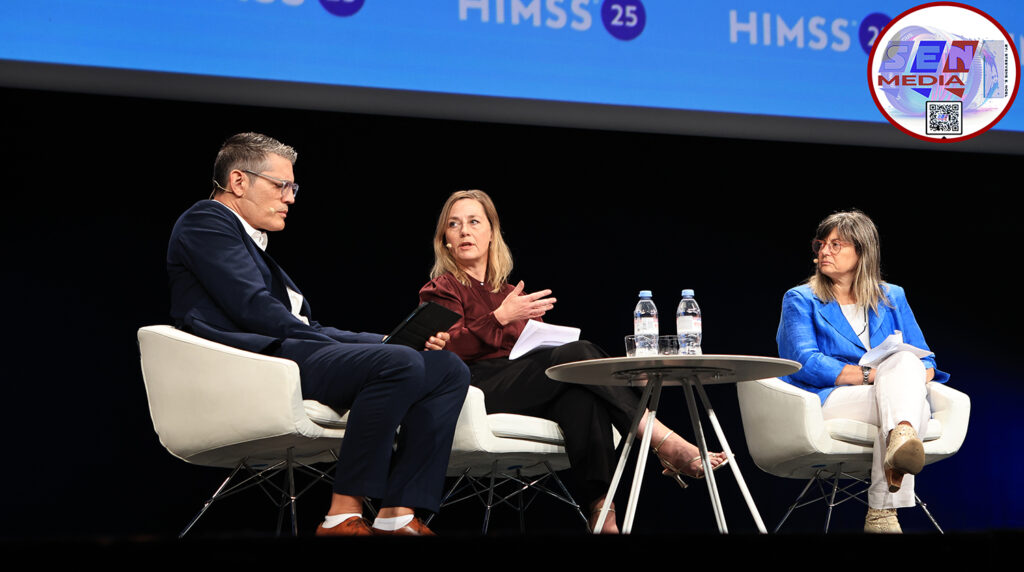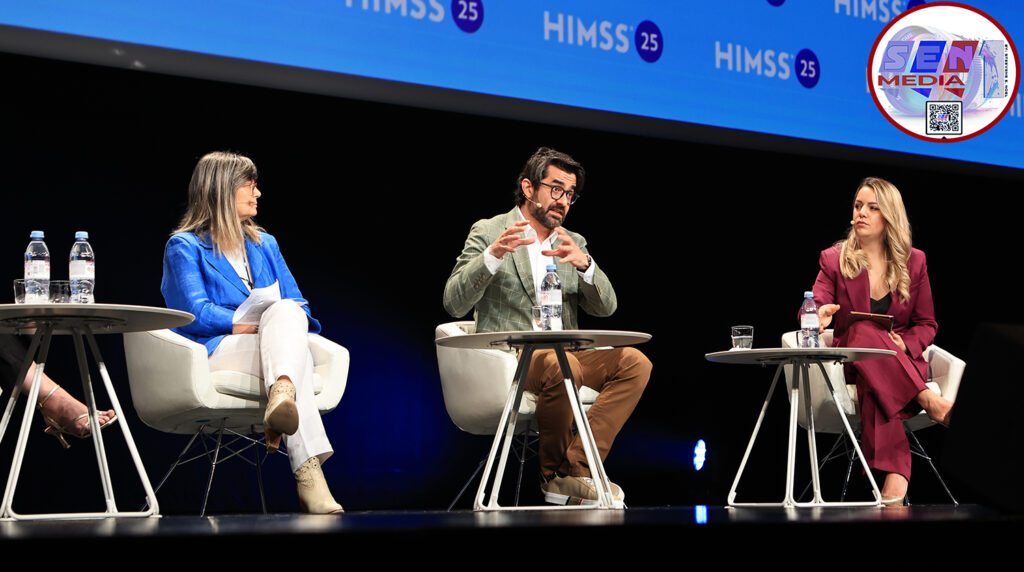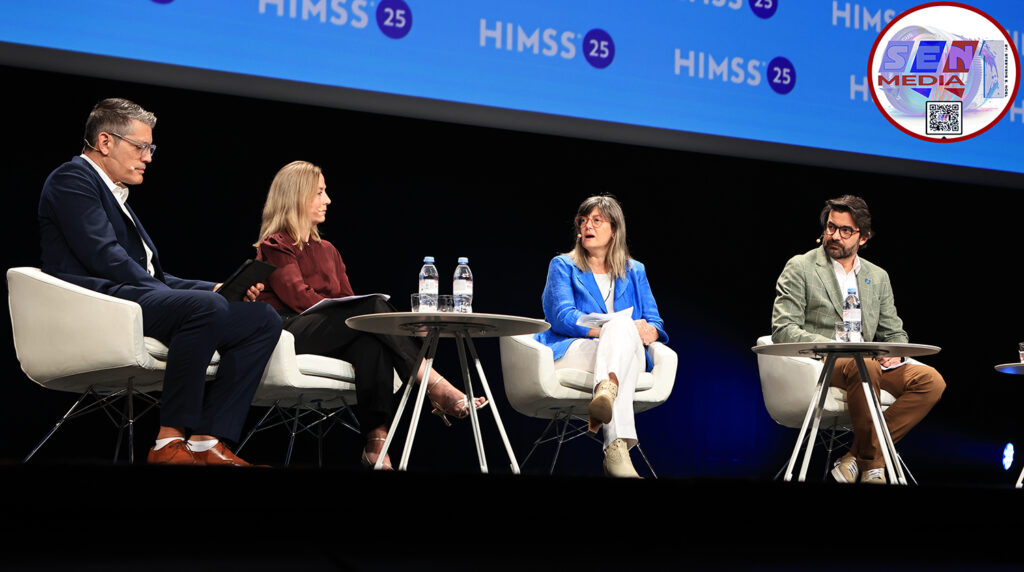Paris, France — At the HIMSS25 Europe conference, senior leaders from the World Health Organization (WHO), the European Commission, and Denmark’s Ministry of Health convened for a pivotal fireside chat on Europe’s digital health ambitions. Moderated by Gary Monk, a digital health consultant based in Portugal, and Anca del Río, WHO’s data and digital health consultant, the session underscored Europe’s determination to lead globally in health innovation while safeguarding public trust and patient empowerment.
The session, titled “Keeping Europe’s Future Bright”, brought together a powerhouse panel: Dr. David Novillo Ortiz, WHO Europe’s Head of Data and Digital Health; Fulvia Raffaelli, Head of the Digital Health Unit at the European Commission’s DG SANTE; and Dorte Bech Vizard, Deputy Permanent Secretary at Denmark’s Ministry of the Interior and Health.
Digital Health as a Strategic Pillar
DORTE BECH VIZARD Deputy Permanent Secretary, Patient Safety, Life Science and
International Cooperation, Danish Ministry of the Interior and Health Denmark & FULVIA RAFFAELLI Head of Digital Health Unit, European Commission DG SANTE Belgium Photo Credit: Steevens Noel – SEN 1 Media
Kicking off the session, Dorte Bech Vizard framed the conversation in the broader context of European policy: “Two of the most pressing concerns for Europe today are competitiveness and security. Health data and life sciences can—and must—serve both.”
Denmark, currently holding the EU Council presidency, intends to use that platform to reinvigorate Europe’s lagging clinical trial capacity. “The EU has been falling behind other global regions in research and innovation,” Vizard noted. “We want to initiate a political conversation on boosting clinical trials and health R&D.”
On the issue of security, she stressed the dual challenge of cybersecurity and preparedness. “The precondition for leveraging health data is keeping it secure,” she said. At the same time, initiatives like the EU’s Critical Medicines Act call for greater data transparency to improve access and stockpiling during crises. “To support European solidarity, we need data that is accessible across the full spectrum,” she emphasized.
A New Legal and Technological Backbone
Representing the European Commission, Fulvia Raffaelli brought optimism as the EU Health Data Space (EHDS) regulation and AI Act both near implementation. “We’re standing on solid ground. These frameworks create the conditions for secure, cross-border data access and the ethical deployment of AI in healthcare,” she said.
The EHDS regulation ensures that EU citizens will have immediate, free access to their electronic health records anywhere in Europe. “You can forget about paperwork or lost medical histories,” said Raffaelli. “Wherever you are in the EU, your care provider will have access to your medical data—with your consent—and you’ll also have control over what is shared.”
The regulation also supports secondary data use for research, innovation, and policymaking. “There’s an act of solidarity in sharing anonymized data,” she added. “It accelerates future therapies and improves public health outcomes.”
Asked to envision the future, Raffaelli shared a compelling metaphor: “By 2035, I hope the EHDS becomes so seamless, people forget it exists—just like how we forgot about roaming charges. It simply works, everywhere in Europe.”
WHO’s Dual Mandate: Global Strategy, Local Execution
DR DAVID NOVILLO ORTIZ Head of Data & Digital Health, WHO Denmark &
ANCA DEL RÍO Data & Digital Health Consultant, World Health Organization (WHO) Switzerland
Photo Credit: Steevens Noel – SEN 1 Media
Dr. David Novillo Ortiz provided insight into WHO Europe’s regional strategy and global alignment. “Our global digital health strategy, renewed just weeks ago by 194 member states, now extends to 2027 with a forthcoming framework through 2033, which will prioritize AI,” he said.
But while artificial intelligence draws headlines, Novillo emphasized more foundational work is still needed. “Twenty-five percent of health-related Sustainable Development Goals have no data available today. Before we automate, we must build solid, inclusive data foundations.”
The WHO recently completed a study on AI usage in 50 of 53 European countries, highlighting governance, ethics, and AI literacy as areas needing urgent attention. A new roadmap on AI for Health in Europe is being developed in response.
On trust, Novillo said WHO is also focused on bridging public-private divides, dispelling the notion that public-private partnerships can’t work in healthcare. “We’ve launched the Strategic Partners Initiative, bringing together 115 institutions—governments, academia, NGOs, and industry—to align innovation with real-world needs. We must involve the private sector, but under clear rules of engagement.”
Denmark’s Blueprint for Trust
Denmark has long been seen as a model for digital health. Asked what fosters public trust, Dorte Bech Vizard identified three principles: citizen-centered design, transparency, and vigilance.
“Digital tools must deliver value to patients—not just the system,” she said. In Denmark, citizens retain full ownership of their data, with complete visibility over who accesses it and for what purpose. “It’s their data, not the government’s, not the insurance company’s.”
But trust, she warned, is fragile. “It’s like a Fabergé egg—beautiful but breakable. You have to wrap it in cotton. One breach, and it’s hard to regain.”
A More Empowered Relationship
As digital health matures, the relationship between citizens and governments is poised to transform. “If we get this right, we’ll move from passive care delivery to co-creation of care,” said Vizard. “Patients will help shape their care, leading to more personalized and accessible systems across Europe.”
She also stressed the need for equity. “Digital health should not become a tool of exclusion. Solutions must be designed to ensure equal access across diverse populations and regions.”
Europe’s Role in a Changing World
DORTE BECH VIZARD Deputy Permanent Secretary, Patient Safety, Life Science and
International Cooperation, Danish Ministry of the Interior and Health Denmark & FULVIA RAFFAELLI Head of Digital Health Unit, European Commission DG SANTE Belgium & DR DAVID NOVILLO ORTIZ Head of Data & Digital Health, WHO Denmark.
Photo credit: Steevens Noel – SEN 1 Media
In the closing moments, Dr. Novillo Ortiz looked ahead. “By 2050, one in three people will be over 60. Already, one in four older adults experiences social isolation. These are global challenges—but Europe has the tools and vision to lead.”
The region’s strengths lie not only in its legal frameworks and technology, but in its people-first philosophy. “Let’s not make the future data-driven,” he concluded. “Let’s make it people-driven.”
As the panel wrapped, Monk summed up the session’s tone with a forward-looking nod: “Europe’s digital health future isn’t just being imagined—it’s being built.”








